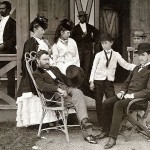
For thirty months many years ago I was a missionary for the LDS Church in a country that no longer exists. There is another, related, similar country, modern South Korea. But the Korea I knew in the late 60s was only a distant ancestor of the Korea that exists today, at least as distant as the Yi Dynasty.
I remember a lot about working in Korea in those days (옛날애는, the Koreans say). One thing that stands out is the hospitality we received. I arrived in March, and it was cold. It wasn’t as cold inside the house, especially not if we were in the kitchen or lying under our duvets on the ondol floor. But if we were standing or sitting up, the temperature inside was only slightly better than that outside. I learned that I could get used to having cold hands and feet, but I didn’t learn to like it.
Knocking on gates as we went from house to house, invariably someone would invite us in, give us the warmest spot, on top of the place where the heat from the ondol fire entered the house, and listen to our spiel. They were only occasionally really interested in what we had to say. Sometimes they hoped we would teach them English. Sometimes they were curious about the odd foreigners who spoke Korean, however badly, and were knocking on all the gates in their neighborhood. But as often as not, they brought us inside because it was cold outside and we had knocked at their house.
Summer was the same. Walking the hot, humid streets of Busan in the summer of 1968, my companion and I would be drenched in sweat, turned down or ignored at gate after gate. Then a young country girl would open a gate and take us inside to the house, where an old aunt or grandmother (almost always a Buddhist) would offer us daejeop (대접), a treat of some kind. If it was near a holiday, perhaps she would give us ddeok (떡), sweetened rice cakes. In summer, it was often sliced tomatoes with sugar on them (with the faint aroma of kimchi from the knife with which they were sliced). Or it might be a glass of shikhye (식혜), a sweetened rice drink, or plain misutgaru (미숫가루), roasted and ground rice suspended in cool water. My first smoothie.
In these encounters we probably thought of ourselves as something like the strangers on the plains of Mamre. They thought of us merely as strangers. Nevertheless, like Abraham they offered us hospitality. In fact, that’s the meaning of the work daejeop: hospitality. Similar to the English treat, which is related to treatment and entreaty, daejeop means to connect with someone by waiting on them. (The Chinese is 待接—thanks Mark Peterson.)
Jesus taught us hospitality in the parable of the Good Samaritan who welcomed and served the wounded man. He taught it in the parable of the father and two sons, where the father welcomes the prodigal son and waits on him. The Good Samaritan gave welcome and comfort to a complete stranger, in fact someone who could have been considered an enemy. Much to the chagrin of the older son, the father welcomed and gave comfort to a son who had decimated the family fortune and ruined their reputation—and whom the older son charged with immoral conduct, though the story says only that he wasted his money on extravagant living.
In spite of a supposed Christian heritage in many of the affected countries, a spirit of unwelcome hovers over wide swaths of the world today. Unwelcome to immigrants. Unwelcome to those who worship differently, such as Muslims and sometimes Mormons and other minority religions such as the Jehovah Witnesses. Unwelcome to other races (whatever the strange term race might mean). Unwelcome to LGBT. In many places, unwelcome to women. Unwelcome to unfamiliar cultures. Unwelcome to those whose politics differ from our own. Unwelcome to government in general, sometimes to the very idea of government (unless, of course, it does what I want and not what someone else wants).
We are all strangers to God, estranged from him. Nevertheless, he has already served us by creating this world and offering his Son as a sacrifice for sin. His welcome begins before we have entered this world, and he opens his arms to welcome us into his home if we wish to return.
Those who would imitate God must also imitate his hospitality. We must receive others as he promises to receive us, as if they were the Son himself (Romans 8:14-17).










